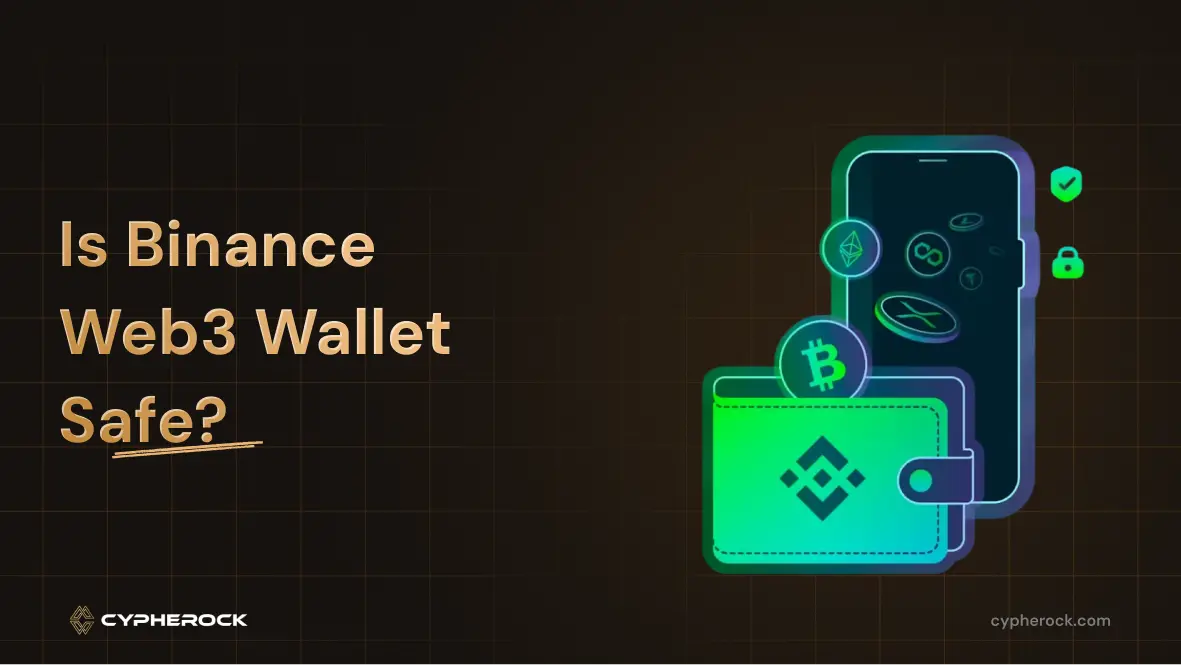

Your crypto assets are only as safe as the wallet that protects them. Every day, hackers and scammers look for weak points. They target exchanges, trick users into blind signing, and exploit software bugs.
We have seen exchanges collapse, locking people out of their funds. Many users lose coins to phishing emails, fake websites, or even malware on their phones. If your wallet is weak, you are always one mistake away from losing everything.
That’s why wallet safety is critical. Binance claims its Web3 Wallet is secure, seedless, and self-custodial. But you may wonder, is it really safe enough for long-term use?
The short answer: it’s safer than custodial wallets, but it still comes with risks. That’s why many serious investors prefer hardware wallets like Cypherock X1, which splits your private keys across multiple components, leaving no single point of failure.
Before you trust any wallet, let’s break it down.
Think of a crypto wallet as a keychain. It doesn’t hold your coins directly. Instead, it holds your private keys, the codes that let you unlock and move your funds on the blockchain.
Your private key is like the key to your house. If someone else gets it, they can walk in and take everything.
Now, there are two main types of wallets:
Self-custody is the true spirit of crypto. Freedom and control, but also responsibility.
This is where wallets like Cypherock X1 stand out. Most wallets give you a single seed phrase to secure. Cypherock eliminates this vulnerability by splitting your keys across five shards using Shamir’s Secret Sharing. You don’t need to worry about hiding a fragile seed phrase anymore.
The Binance Web3 Wallet is designed for self-custody but without a traditional seed phrase. Instead, it uses MPC (Multi-Party Computation).
Here’s how it works:
To access your funds, you need at least two of the three shares. This setup means that no single party can control your wallet alone, not even Binance.
The benefit? You don’t need to write down a 24-word seed phrase. You just protect your device and your recovery password.
This system reduces the chance of losing funds to seed phrase theft, which is common with many wallets.
There are several reasons people find Binance Web3 Wallet appealing:
No Seed Phrase Requirement
You don’t have to write down a phrase that could be stolen. This makes it easier for beginners who fear losing paper backups.
Emergency Export Option
You can export your private keys at any time. This feature lets you move to another wallet if you choose. Once you export, the Binance Wallet shuts down for security reasons.
True Self-Custody
Binance holds one share, but they cannot move funds without your other shares. You always control access.
Cloud Recovery
If you lose your phone, you can still recover your wallet using the cloud backup and Binance’s share. This reduces the fear of device loss.
Together, these benefits make the Binance Web3 Wallet more user-friendly than traditional wallets.
Still, there are important risks you must understand:
You Are Responsible for Two Shares
If you lose both your device and your recovery password, your funds are gone. No one can help you.
Cloud Storage Risks
Backing up a key share to iCloud or Google Drive adds a risk. If someone hacks your account, they might gain access to that share.
Partial Reliance on Binance
Even though Binance can’t move your funds, it still holds one share. This adds an element of trust in the company.
Emergency Export Is Permanent
If you use the export function, the Binance Wallet becomes unusable. You must move your funds elsewhere.
Not Fully Offline
Since key-shares are tied to devices and cloud storage, your wallet is never 100% disconnected from the internet. This leaves open possible attack surfaces.
These risks don’t make the wallet unsafe, but they show why it’s not the strongest long-term security option.
Now let’s compare.
Binance Web3 Wallet:
Hardware Wallets:
Hardware wallets are built for long-term holders who want maximum security. They protect against blind signing, malware, and online threats.
Some examples are Cypherock, Ledger, and Trezor. But not all hardware wallets are equal.
Here’s where Cypherock X1 goes beyond Binance Web3 Wallet and even beyond other hardware wallets:
Unlike Binance Web3 Wallet, Cypherock X1 does not rely on a company to hold part of your access. It’s designed for independence and resilience.
If you want to compare, check out:
If you decide to try Binance Web3 Wallet, here’s how to set it up:
This process is quick, but remember that you carry responsibility for your recovery password and cloud security.
Binance Web3 Wallet is safer than custodial wallets because you control your assets. The MPC system makes it harder for hackers to steal your keys, and the lack of a seed phrase helps beginners feel more secure.
But it still has weak points. Cloud backups can be hacked. Losing your device and recovery password means losing your funds forever. And because Binance holds one share, there is still a small element of reliance on the company.
If you want the best balance of convenience and control, Binance Web3 Wallet works fine. But if your goal is true offline security and long-term peace of mind, then Cypherock X1 is the stronger choice.
It removes seed phrases, stays air-gapped, and ensures your keys can never be lost to a single failure.

Start securing your crypto journey today—visit Cypherock X1 to learn more.
Connect with us:
Twitter: @CypherockWallet
Telegram: Join the Community
